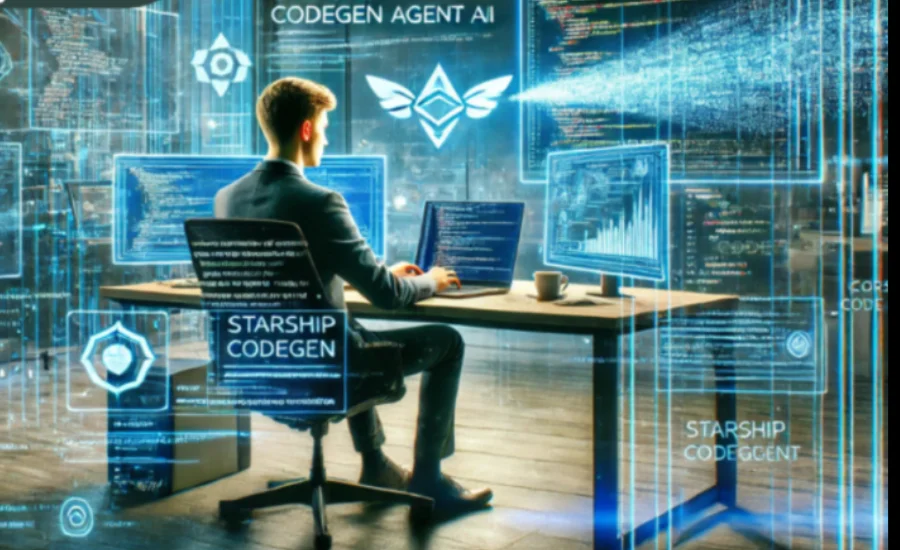Artificial Intelligence (AI) is evolving at an unprecedented pace, constantly reshaping industries and pushing technological boundaries. Among the most groundbreaking advancements in AI is the Starship CodeGen Agent, a transformative tool that is redefining the way AI programming is approached.
This in-depth exploration delves into the features and potential of the Starship CodeGen Agent, shedding light on its pivotal role in AI development. By understanding its unique capabilities, we can grasp the significant impact it is having on the future of artificial intelligence.
What is the Starship CodeGen Agent?
At its core, the Starship CodeGen Agent is an artificial intelligence-powered tool designed to assist developers in writing code quickly and efficiently. It operates on the principles of natural language processing and machine learning, allowing developers to input coding requests in plain English (or another natural language) and receive high-quality code in return. This approach makes coding more accessible to individuals who may not have a deep understanding of specific programming languages or coding syntax.
The Starship CodeGen Agent can generate code snippets, entire modules, or even complete applications based on user input. Developers can specify the functionality they need, describe the problem they are trying to solve, or even provide rough outlines of what they want, and the agent will take care of the rest. The AI behind the tool has been trained on massive datasets of code from a wide variety of programming languages and frameworks, making it versatile enough to handle different coding tasks across multiple domains.
How the Starship CodeGen Agent Works

The Starship CodeGen Agent relies on sophisticated machine learning models, including those based on natural language processing (NLP) and deep learning. These models are trained to understand the meaning behind human language and translate it into executable code. This allows developers to bypass the need for manually writing code line by line, speeding up the development process and minimizing human error.
Natural Language Understanding
One of the most powerful aspects of the Starship CodeGen Agent is its ability to understand and process natural language inputs. This means that users can describe what they want the code to do in everyday language, and the agent will generate the corresponding code.
For instance, if a developer needs a function to calculate the factorial of a number, they could simply type something like “Write a Python function that calculates the factorial of a given number.” The agent would then generate the appropriate Python code to accomplish this task. This is incredibly useful for developers who may not be familiar with specific programming syntax or for those working in multiple languages simultaneously.
Machine Learning and Code Generation
The Starship CodeGen Agent is powered by machine learning models that have been trained on vast amounts of open-source code from repositories like GitHub and Stack Overflow. These models can recognize patterns in code structure, function definitions, and even common algorithms. When a developer inputs a request, the agent uses these models to match the input with relevant patterns from its training data, generating code that fits the specified requirements.
This machine learning approach means that the Starship CodeGen Agent is constantly learning and improving. Over time, it can refine its ability to generate more accurate and efficient code, adapting to new coding trends, languages, and best practices as they emerge.
More Technical Details of How the Starship CodeGen Agent Works

The Starship CodeGen Agent combines several cutting-edge technologies to deliver its functionality, each playing a key role in its efficiency and effectiveness.
1. Machine Learning Models: Deep Neural Networks and Transformer Architecture
At the heart of the Starship CodeGen Agent is its machine learning engine, which likely relies on deep neural networks and transformer architecture (such as GPT or Codex). These models are specifically designed to understand the complexities of both human language and programming languages.
- Deep Learning: The agent’s core model is trained using supervised learning and unsupervised learning techniques, where vast amounts of coding data are used to teach the model about code patterns, structures, and syntax. Deep neural networks help identify the underlying relationships between coding concepts and structure, allowing the model to predict or generate code based on the user’s request.
- Transformer Architecture: This type of neural network, popularized by models like GPT-3 and Codex (which powers GitHub Copilot), excels at understanding the context of words in sequences. Transformers break down language into tokens and use attention mechanisms to focus on relevant parts of the code or request, generating outputs that follow the input’s structure accurately.
For example, if you ask the Starship CodeGen Agent to generate a function that adds two numbers, it will focus on the mathematical and syntax patterns that match the input, ensuring the correct language and code format.
2. Code Representation and Understanding
The Starship CodeGen Agent goes beyond simply recognizing syntax; it understands the semantic meaning behind code. This is achieved by analyzing abstract syntax trees (ASTs) or even higher-level representations of code. An AST is a structured representation that breaks down the source code into components (such as variables, operations, and loops) that can be processed and understood more easily by the AI.
For example, when you ask the agent for a sorting algorithm in Python, the agent recognizes that the task involves sorting a list, and from there, it can decide the most efficient sorting method (e.g., quicksort, mergesort, or insertion sort) based on the size of the input data and common practices.
3. Reinforcement Learning for Optimization
Some versions of the Starship CodeGen Agent may incorporate reinforcement learning (RL) to optimize its code generation capabilities. In this model, the AI gets “feedback” based on how well it produces code that fulfills a user’s request. Over time, the agent refines its ability to choose more efficient or more appropriate code snippets, learning from past successes and mistakes.
In practice, this could mean that after receiving feedback (e.g., whether the generated code is efficient, error-free, or meets performance expectations), the agent “learns” from these evaluations, gradually improving its output.
Key Features of the Starship CodeGen Agent
The Starship CodeGen Agent comes equipped with several powerful features that make it an indispensable tool for modern software development. These features enhance its usability, versatility, and ability to integrate into various development workflows.
1. Natural Language Processing (NLP)
As mentioned earlier, the Starship CodeGen Agent uses advanced natural language processing techniques to understand and process user inputs. By allowing developers to input their requirements in plain English (or other languages), the agent removes the need for specialized coding knowledge, making programming more accessible to a broader range of users.
Whether you need a function to calculate the area of a circle or a complex algorithm for sorting data, the Starship CodeGen Agent can interpret your natural language instructions and generate the code that meets your needs.
2. Multi-Language Support
The Starship CodeGen Agent supports multiple programming languages, including Python, JavaScript, Java, C++, Ruby, PHP, and more. This allows developers to use the tool regardless of the programming language they are working in. For example, if a developer is building a web application using JavaScript, the agent can generate the necessary front-end and back-end code. Similarly, if the task involves data analysis using Python, the agent will generate Python code tailored to the specific requirements.
This multi-language support is particularly beneficial for developers who work with a variety of languages and frameworks, as it ensures they can rely on a single tool to handle all of their coding needs.
3. Real-Time Code Generation
One of the standout features of the Starship CodeGen Agent is its ability to generate code in real-time. When a developer inputs a request, the tool processes the information and returns the corresponding code almost instantaneously. This is a significant time-saver, as developers no longer have to manually write every line of code themselves.
Real-time code generation allows for faster prototyping, iteration, and debugging, which is especially valuable in fast-paced development environments. This feature is particularly beneficial for teams working on projects with tight deadlines or for individual developers who need to complete tasks quickly.
4. Customizable Templates
To make the code generation process even more efficient, the Starship CodeGen Agent offers customizable templates. These templates are predefined code structures that developers can use as a foundation for their projects. They ensure consistency across different projects and allow developers to save time by not having to recreate common patterns from scratch.
For instance, a developer could create a template for a RESTful API endpoint, specifying the methods, routes, and parameters. When starting a new project, the developer could use this template to generate the basic structure of the API, and then focus on customizing it to meet the specific needs of the application.
5. Seamless Integration with Development Environments
The Starship CodeGen Agent integrates seamlessly with popular Integrated Development Environments (IDEs) such as Visual Studio Code, PyCharm, and Eclipse. Developers can use the tool directly within their IDEs, streamlining their workflow and allowing them to generate code without having to switch between different applications.
This integration is particularly valuable for developers who are working in complex development environments that require constant testing, debugging, and editing. By having the Starship CodeGen Agent built into the IDE, developers can quickly generate code, run tests, and make adjustments without leaving their coding environment.
Benefits of Using the Starship CodeGen Agent

The Starship CodeGen Agent offers a wide range of benefits for developers, from increased productivity to improved code quality.
1. Increased Productivity
The Starship CodeGen Agent dramatically increases developer productivity by automating many of the repetitive and time-consuming tasks associated with coding. By generating boilerplate code, functions, and modules in real time, developers can save hours of manual work and focus on more complex, creative tasks. This increase in productivity is especially useful for large teams working on complex projects, as it allows them to complete tasks more efficiently.
2. Improved Code Quality
The Starship CodeGen Agent is trained on vast datasets of high-quality code, meaning it can generate code that adheres to best practices and follows industry standards. This helps ensure that the code is reliable, maintainable, and free of common errors. Additionally, the agent generates code that is optimized for performance, reducing the likelihood of bugs or inefficiencies.
3. Shorter Development Cycles
By automating the code generation process, the Starship CodeGen Agent helps reduce development time and shorten project timelines. Developers can quickly generate code for common functions or structures, allowing them to spend more time on critical design decisions and higher-level problem-solving.
4. Cost Efficiency
The Starship CodeGen Agent can significantly reduce the cost of software development by automating many of the tasks that would otherwise require manual labor. This reduction in human effort can lead to lower development costs, making it easier for organizations to stay within budget while still delivering high-quality software on time.
5. Accessibility for Non-Technical Users
One of the most exciting aspects of the Starship CodeGen Agent is its potential to democratize programming. By allowing non-technical users to input coding requirements in plain language, the tool enables individuals without coding experience to create functional software. This opens up opportunities for collaboration across teams and allows businesses to leverage the expertise of employees who may not have a background in programming.
Applications of the Starship CodeGen Agent
The Starship CodeGen Agent is a versatile tool that can be used in a wide variety of applications. Below are some of the most prominent use cases for the agent:
1. Web Development
For web developers, the Starship CodeGen Agent can generate everything from basic HTML structures to complex JavaScript functions and back-end APIs. This can save developers a significant amount of time, particularly when working on large-scale web applications that require repetitive coding tasks.
2. Mobile App Development
Mobile app developers can use the Starship CodeGen Agent to quickly generate code for common mobile app functions, such as user authentication, data storage, and navigation. This allows developers to focus on creating unique features for their apps, rather than spending time on routine tasks.
3. Data Science and Machine Learning
The Starship CodeGen Agent can assist data scientists by generating Python code for data analysis, machine learning algorithms, and statistical models. This can help accelerate the prototyping process and allow data scientists to test multiple models more quickly.
4. Game Development
Game developers can use the Starship CodeGen Agent to generate code for in-game mechanics, player interactions, and AI behavior. By automating the creation of basic structures, the agent enables developers to focus on more complex aspects of game design, such as level creation and storytelling.
Challenges and Future of the Starship CodeGen Agent

While the Starship CodeGen Agent offers many benefits, there are still some challenges and limitations that need to be addressed. One of the main challenges is ensuring the generated code is always optimized for performance and scalability. In some cases, the AI might generate code that works but is not the most efficient solution, which could lead to performance issues in larger applications.
Another challenge is ensuring the Starship CodeGen Agent stays up-to-date with the latest programming languages, frameworks, and best practices. As new tools and technologies emerge, the AI behind the tool must be constantly retrained and improved to keep up with the changing landscape of software development.
Looking ahead, the potential for the Starship CodeGen Agent is immense. As machine learning models continue to evolve and become more sophisticated, the capabilities of the Starship CodeGen Agent will expand, leading to even more powerful and intuitive development tools. The future may see even deeper integration of AI into the development process, creating an environment where developers work alongside intelligent agents to create cutting-edge software faster and more efficiently than ever before.
Also Read: Rules of Coding For Both Novice and Sage Developers
Final Words
The Starship CodeGen Agent is revolutionizing software development with its advanced AI capabilities, enabling developers to write code faster and more efficiently. By leveraging natural language processing and machine learning, this tool transforms plain language requests into high-quality code across multiple programming languages. Its real-time code generation, multi-language support, and seamless integration with popular IDEs make it a powerful asset for web development, mobile apps, and even game creation.
Key features like customizable templates and reinforcement learning ensure the Starship CodeGen Agent produces efficient and accurate code while continually improving. It boosts productivity, enhances code quality, and shortens development cycles, empowering developers to focus on innovation.
Despite challenges such as maintaining efficiency and adapting to emerging technologies, the Starship CodeGen Agent represents the future of AI-driven programming. By democratizing coding and making it accessible to non-technical users, this groundbreaking tool is set to reshape the software industry, driving faster, smarter, and more cost-effective development processes.
For the latest insights and innovations in AI, stay tuned to Insight Rays for cutting-edge updates and expert analysis.



